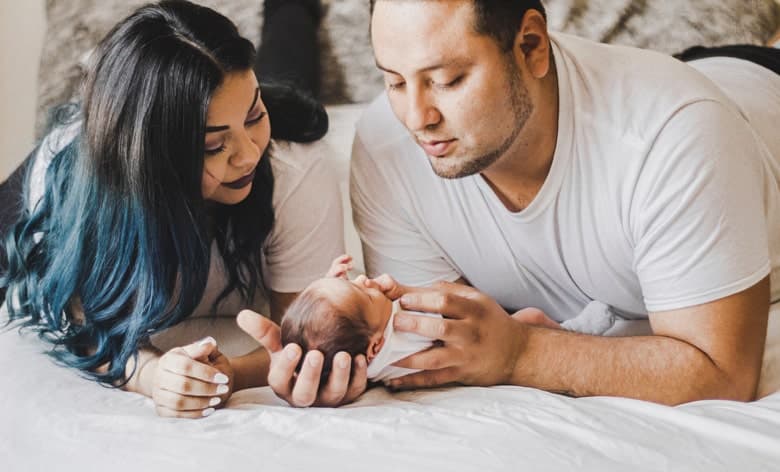What are Baby Blues?
Baby blues, also known as postpartum blues, is a relatively common experience for women after giving birth. It’s an anxious and uncomfortable feeling characterized by mood swings, crying spells, and difficulty sleeping. Baby blues usually begins a few days after childbirth and goes away within a couple of weeks. The origins of this health malaise are not fully understood, but it’s believed to be caused by hormone changes which affect human bodies after the physical experience of giving birth, and the emotional demands of caring for a newborn.
If you’re experiencing baby blues, it’s important to remember that you’re not alone and this is a normal and temporary part of the postpartum period. It can be helpful to talk to your partner, family, or a trusted friend about how you’re feeling, and to seek support and get couples counselling if anxious and uncomfortable symptoms persist or become more severe. Taking care of yourself by getting enough rest, eating well, and finding time to do things you enjoy can also be helpful in managing baby blues.

For postpartum depression, discuss your feelings with loved ones and consider couples counselling if symptoms intensify or persist.
What’s the Difference between Baby Blues and Post Partum Depression?
Baby blues and postpartum depression are two different conditions which can occur after giving birth. Postpartum depression is a serious condition which can occur at any time within the first year after childbirth. It affects one in seven women who give birth in Canada. Symptoms of postpartum depression can include feelings of sadness, hopelessness, and worthlessness, as well as difficulty emotionally bonding with the baby, low energy, lack of motivation, and difficulty sleeping. Postpartum depression can interfere with a woman’s ability to care for herself and her baby and can have long-term consequences if left untreated.
If you’re experiencing symptoms of postpartum depression it is important to seek help from a mental health professional. Treatment options may include therapy, medication, or a combination of both. It is also important to remember that postpartum depression is not your fault and that with treatment, most people immediately recover their full capabilities in a short period.
Postpartum depression is a form of depression that can affect women after giving birth. It is a common and serious condition that can occur any time within the first year after childbirth. Symptoms of postpartum depression can include feelings of sadness, hopelessness, and worthlessness, as well as difficulty bonding with the baby, low energy and motivation, and difficulty sleeping. If you are experiencing postpartum depression, it is important to seek help from a mental health professional. Treatment options may include therapy, medication, or a combination of both. It is also important to remember that postpartum depression is not your fault and that with treatment, you can recover and feel like yourself again.
Post Partum Depression in Men.
It’s not uncommon for men to experience malaise known as paternal postpartum depression (PPPD) after the birth of a child. This type of depression can affect men in the same way that postpartum depression affects women, with symptoms such as feelings of sadness, hopelessness, and worthlessness, as well as difficulty bonding with the baby, low energy and motivation, and difficulty sleeping. PPPD can be caused by a number of factors, including the stresses of fatherhood, changes in the relationship with the partner, and hormonal changes that can occur after the birth of a child.

Discover clarity and relief with expert mental health guidance tailored for men experiencing PPPD.
If you’re a man experiencing PPPD, it’s important to seek help from a mental health professional. Treatment options may include therapy, medication, or a combination of both. It is also important to remember that PPPD is not your fault and that with treatment, you can recover and feel like yourself again.
Past Trauma Can Resurface After Childbirth.
Sometimes past trauma can resurface after giving birth. The childbirth process and all the responsibilities of caring for a newborn can be overwhelming and trigger memories of past trauma. This can be particularly true for those who have experienced trauma related to giving birth or parenting in the past.

Nurturing a newborn can evoke past traumas, making the experience intense and challenging.
If you’re experiencing flashbacks or other distressing symptoms related to past trauma after giving birth, it is recommended to seek help from a mental health professional as a therapist can help process and manage the feelings and memories that have been triggered, and develop coping strategies to support healing. It’s also important to reach out to a supportive network of friends and family for help and to take care of yourself by getting rest, eating well, and by engaging in self-care activities.
Conflicts Amongst New Parents
It’s common for new parents to experience conflicts and challenges as they adjust to their new roles and responsibilities. The transition to parenthood can be a time of great change and stress, and it is natural for couples to have differences of opinion and to experience conflicts.
Some common sources of conflict among new parents include:
- Differences in parenting styles
- Differences in expectations of each other’s roles and responsibilities
- Differences in levels of support and involvement in caring for the baby
- Sleep deprivation and fatigue
- Financial stress and changes in household dynamics
To manage conflicts and challenges as a new parent, it can be helpful to:
- Communicate openly and honestly with each other
- Seek support from friends, family, or a therapist
- Practice self-care to manage stress and fatigue
- Make time for each other as a couple
- Set aside specific times to discuss and address conflicts or challenges
Remember, it’s normal for new parents to experience conflicts and challenges. It’s important to be patient and understanding with each other and to seek help if conflicts become overwhelming or unmanageable.
Couples Counselling for New Parents
Couples counselling can be a helpful resource for new parents experiencing challenges as they adjust to their new roles and responsibilities. A couples therapist can help couples to,
- Communicate more effectively and resolve conflicts in a healthy way
- Understand and manage their different perspectives and needs
- Increase emotional connection and support
- Develop strategies for managing stress and building a strong and healthy relationship
If you are a new parent interested in couples counselling, please AERCS. Please be confident we have a great deal of experience working with couples of all ages and in all circumstances, including those suffering from post partum depression. It’s also a good idea to check with your insurance provider to see if couples counselling is covered under your plan.
Remember, seeking help is a sign of strength and can be an important step towards becoming great parents.

